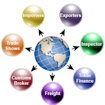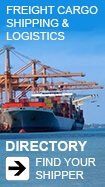The Role of Export-Traders and Buying Trend
Export-traders play a crucial role in international trade. Prior to the 1970's when export product quality was a common problem in many less developed countries, foreign buyers relied on export-traders for product sourcing and pre-shipment inspections. The nature of the order then normally was fewer items and more volume, that is, the number of items was few and the quantity of each item was large. At that time, many manufacturers did not know how to export, thus they relied upon export-traders for exporting, known as indirect exporting.
There were far fewer exporters worldwide before the 1970's. The foreign buyers then did not have many export sources from which to compare an offer. The export business was lucrative due to much less competition. As time progressed, competition built. The manufacturers competed on providing better quality products and lowering prices. The price war made the traditional practice of single source of supply difficult for export-traders to maintain. The export-traders changing the source of supply of similar products from one manufacturer to the other became inevitable. The manufacturers needed to survive and direct exporting was the solution. Many manufacturers started exporting directly in the mid-1970's.
Export product quality in general improved markedly in the late 1970's. However, the problem of quality remains a nightmare to some importers. During the oil crisis of the late 1970's, there was a significant increase in the number of manufacturers who export directly. Many foreign buyers deal directly with the manufacturers to save commission or fees and/or markups of export-traders.
In the early 1980's, the ordering trend became more items and less volume, that is, the number of items was many and the quantity of each item was small. This new trend made direct exporting unprofitable for some manufacturers. The more-item-and-less-volume trend, which enhances the popularity of indirect exporting, is best handled by the export-trader.
For a manufacturer to maintain its own export personnel is not economical in some countries. It is better to work with export-traders. For an importer to source and buy directly from foreign manufacturers can be uneconomical too.
Not all export-traders perform well. Importers may still encounter quality problems because of lack of inspection on the part of the export-trader, despite the fact that the exporter's pre-shipment inspection is required in the order. The inspection is an additional cost to export-traders. Importers must watch out for exporters who promise anything in order to obtain the order.
- Source from manufacturers worldwide
- Find inspection, freight services and more
- Access global trade resources and guides
- Be part of largest global trade community and much more...
- Be where your customers are!
- Promote and market your services
- Receive direct quote requests
- Back office support, set up regional offices and much more...



